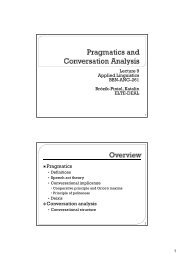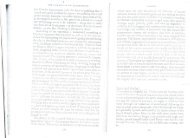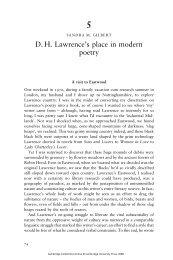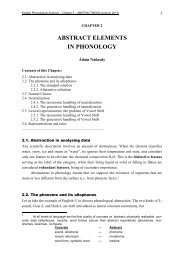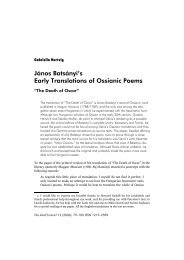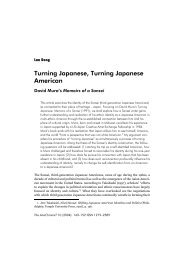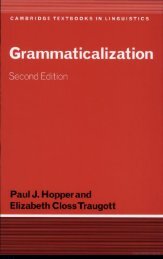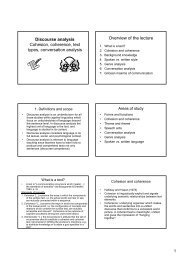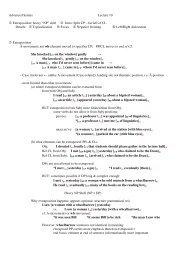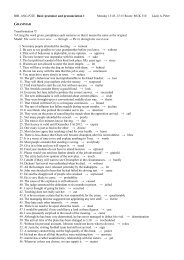What and where? Péter Szigetvári - SEAS
What and where? Péter Szigetvári - SEAS
What and where? Péter Szigetvári - SEAS
You also want an ePaper? Increase the reach of your titles
YUMPU automatically turns print PDFs into web optimized ePapers that Google loves.
<strong>What</strong> <strong>and</strong> <strong>where</strong>? 121<br />
The fact that palatalization, like in virtue <strong>and</strong> tuna – which incidentally is<br />
accompanied by affrication (cf. footnote 33) – first occurs in unstressed syllables,<br />
<strong>and</strong> stressed syllables are affected only in a second go argues for treating (at<br />
least this kind of) affrication as lenition. While it is true that palatalization is<br />
assimilation, not lenition, it was also established that consonants are more prone<br />
to undergo assimilation when they are in a weak position. I prefer to remain<br />
agnostic on this issue.<br />
Lass <strong>and</strong> Anderson say: “The least radical lenition of a voiceless stop involves<br />
timing: the closure is released, not at the moment of voice-onset on a<br />
following vowel, but before it” (1975 : 152). Accordingly, they treat both [t] ><br />
[⁀ts] <strong>and</strong> [t] > [t h ] as cases of lenition. One problem with the contention that a<br />
plain stop becoming aspirated should be lenition is that in systems <strong>where</strong> aspiration<br />
is fully functional, that is, <strong>where</strong> aspirated consonants systematically<br />
contrast with nonaspirated ones, neutralization, for example, word finally, yields<br />
a voiceless unaspirated stop. Such changes are almost exceptionlessly instances<br />
of lenition. It also raises doubts that in English aspirated stops occur in strong<br />
position: pretonically <strong>and</strong> word initially. Based on these arguments, [t] > [t h ] can<br />
hardly be categorized as lenition.<br />
The distribution of aspirated <strong>and</strong> unaspirated voiceless stops in English also<br />
suggests that the former are stronger: while aspirated stops occur word initially<br />
<strong>and</strong> pretonically, their nonaspirated couterparts occupy the typical weak positions,<br />
they are word final, preconsonantal, <strong>and</strong> not followed by stress. Furthermore,<br />
in English the distribution of aspirated stops is remarkably parallel to that<br />
of [h]. Accordingly, if aspiration should be lenition <strong>and</strong> deaspiration fortition,<br />
then the change [h] > ø would have to be classified as fortition, <strong>and</strong> hypothetical<br />
[h]-epenthesis as lenition. It is doubtful that anyone would subscribe to such a<br />
categorization.<br />
We may conclude that aspiration of stops is fortition, or rather, deaspiration<br />
is lenition. The case of affrication is more dubious: there is reason to believe<br />
that this change, at least when it results in a sibilant, constitutes fortition. In fact,<br />
aspiration <strong>and</strong> affrication often go h<strong>and</strong> in h<strong>and</strong>: cf., for example, English time<br />
[t h aIm] or [⁀tsaIm]. Collinge also cites Fourquet, who “requires an interim stage<br />
(e.g., p > p h > (p)f )” in the High German consonant shift (1985 : 65), suggesting<br />
that an aspirated stop is part of the trajectory form a plain stop to an affricate.<br />
Nonetheless, there also is reason to treat affrication as lenition. I refrain from<br />
taking a st<strong>and</strong> in this issue.<br />
slumb/erer, rasb/ery, conf/erence, as well as the examples above) that do not occur word<br />
finally.



